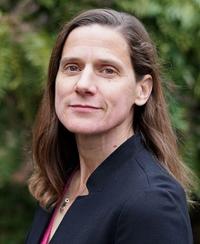Anne Goodchild
Visiting Professor of Business Administration, particularly Logistics, from University of Washington, USA
Solving transportation problems requires collaboration between the public and the private sector.
Professional biography
Dr. Anne Goodchild is Professor of Civil and Environmental Engineering at the University of Washington, and serves as Founding Director of the Supply Chain Transportation & Logistics Center, the latter which launched the Urban Freight Lab in 2016 to bring together the public and private sectors to address the challenges of the urban freight system by engaging in innovative research. She has 15 years of experience leading freight transportation research and is an international border and port operations expert.
She has made significant contributes to transportation engineering in the U.S. and abroad, and has been instrumental in bringing supply chain concepts to freight model architectures. She has worked at the forefront of GPS data applications, identifying observable transportation characteristics that statistically predict transportation behavior.
Dr. Goodchild is the author and co-author of more than 100 research publications. She serves as associate editor for the peer-reviewed scientific journal Transportation Research Record. She chaired the National Academies of Science, Engineering, and Medicine’s Transportation Research Board (TRB) Freight and Marine Chairs group, the top national research organization in her field, from 2016 to 2018.
Dr. Goodchild holds both a doctorate (2005) and a master’s degree (2003) in civil and environmental engineering from the University of California, Berkeley, and a bachelor’s degree (with high honors) in mathematics from University of California, Davis. Before earning her Ph.D. she worked for PricewaterhouseCoopers LLP and Applied Decision Analysis Inc. in Europe and North America designing efficient airline schedules and optimizing research portfolios. She joined the Department of Civil and Environmental Engineering faculty at the University of Washington in 2005.
She teaches logistics and analysis, global trade, transportation & logistics management, and advises graduate students in transportation engineering.
What are your main research interests?
I am interested in making the freight transportation system more sustainable; allowing people to live comfortably in sustainable cities, particularly in the near-term, by finding solutions that solve problems for both the public and the private sector. I believe solutions should be generated through data collection and a thorough understanding of the problem, and then tested in practice.
How does your research have influence beyond the academic world? Does this include any roles you have beyond the academy?
I feel very strongly that academic research should have influence beyond the academic world, and build this in to the entire research approach. I founded and direct the Urban Freight Lab, a collaboration of public and private stakeholders, who are involved in all steps of the research process; problem formation, testing, and evaluation. I previously served as the Freight Advisory Board Chair for the City of Seattle.
Is teaching still a significant part of your working life? What particular method or approach would you say characterises your teaching?
I love to teach, and feel energized after each lecture. In addition to my normal teaching load at the University, I developed and launched a Master’s program and continue to also teach in that program. I work hard to engage the students when they are present either online, or in the classroom through activities and discussions. With graduate students, I expect they will learn from each other, in addition to learning from me.
What specific passions or concerns particularly inspire you in your work?
I feel passionately about the importance of academic research; and that thinking critically, and using robust methods to draw conclusions from precise and accurate data is essential to solving problems. However, I know that it takes work to translate some of these conclusions and outcomes into changes in practice. I am inspired to do that work, and make sure we use our skills and resources to improve lives.
Which of your publications would you regard as the most significant and why?
I actually think the series of reports we have produced through the Supply Chain Transportation and Logistics Center are the most significant, because they have been read by practitioners (http://depts.washington.edu/sctlctr/research/publications). While much of this work has also been published in academic journals, I feel satisfied when I know our research is making a difference in practice.
What are you particularly hoping to achieve during your time as a Visiting Professor in Gothenburg?
I am hoping to compare and contrast the approaches to solving freight problems used in North America and Europe (specifically Sweden and the USA). While we share many of the same challenges, culture, political, and economic structures affect how solutions might be implemented. In doing so, I believe we can strengthen our understanding of solutions, and both find improved mechanisms for improving the quality of life in cities.
Contact
Would you like to meet Anne and/or have an idea for future cooperation?
Send an email to her contact person at the School: Michael Browne
Or visit her home university website!

Focus areas
- Goods movement
- Sustainable freight transportation
- Transportation logistics
- Urban freight
Funding
The Elof Hansson Foundation